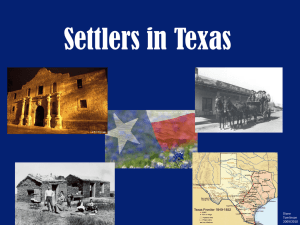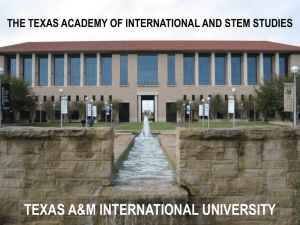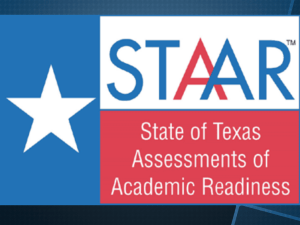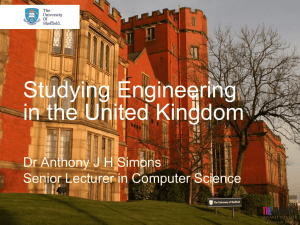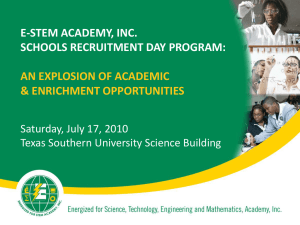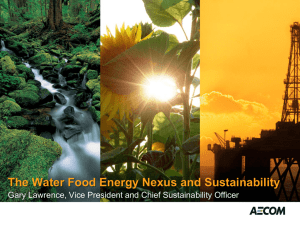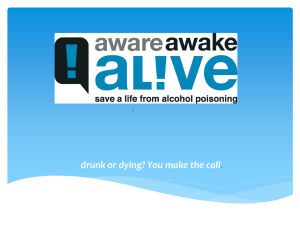Shaun Pyka - SystemsGo
advertisement
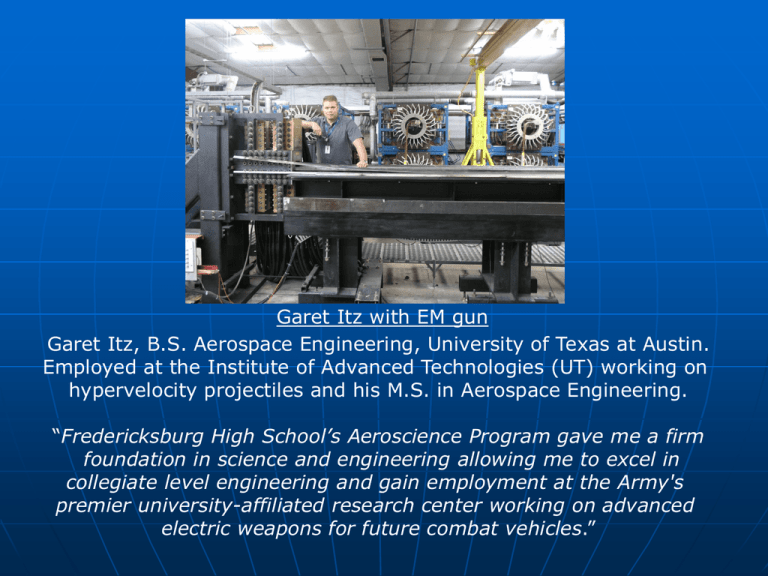
Garet Itz with EM gun Garet Itz, B.S. Aerospace Engineering, University of Texas at Austin. Employed at the Institute of Advanced Technologies (UT) working on hypervelocity projectiles and his M.S. in Aerospace Engineering. “Fredericksburg High School’s Aeroscience Program gave me a firm foundation in science and engineering allowing me to excel in collegiate level engineering and gain employment at the Army's premier university-affiliated research center working on advanced electric weapons for future combat vehicles.” Keneth Piñera Massachusetts's Institute of Technology, MIT - B.S. Mechanical Engineering Employed at FMC Technologies (Product Engineer) “Going through the FHS Aero program (STEM) showed me that hands-on learning is an extremely valuable tool. Not only did it teach me to push my boundaries, it allowed me to see that I could achieve much more than I had thought was possible. I appreciate that I had the opportunity to go through a program that allowed self-learning with hands-on experience as that was instrumental in my transition to studies at MIT and now in my work life at FMC Technologies.” Laura Crenwelge B.S. Biomedical Engineering, Texas A&M University M.S. Aerospace Engineering, Stanford University Image from NASA’s Johnson Space Center Engineering Directorate working on the water reclamation unit for longterm human flight. Presently, employed at Elon Musk’s SolarCity. “Mr. Williams deepened our understanding of physics and engineering principles and helped us develop valuable problem-solving, teamwork, critical thinking, and communication skills by providing us with an exceptional practical application opportunity.” “The FHSAP project was the most formative experience of my high school career. Without having participated in it, I doubt I would have pursued a degree in biomedical engineering at Texas A&M University, co-oping with NASA Johnson Space Center, or desiring to become an astronaut myself.” Received “Eagle Eye” award from NASA and Lockheed Martin for calling abort on an SSME test during his time working on SSME test stand. Awarded NASA’s prestigious Silver Snoopy in 2009 – youngest to receive the award since Apollo era. Justin Junell on SSME test stand. B.S. Applied physics, Kettering University. Employed at NASA’s Stennis Space Center Working on M.S. in Mechanical Engineering. “The FHSAP has had a tremendous impact on my life. It sparked my interest in engineering and aerospace and helped me decide to pursue an engineering degree in college; and, ultimately a career in the aerospace industry. Currently, I work in the modeling and analysis division of NASA’s Propulsion Test Directorate and am pursuing a Master’s Degree in Mechanical Engineering. I attribute FHSAP as the crux of my success. It helped me to see, for the first time, what I wanted to do with my life.” Joshua Jung Co-Director/Technical Director of SpaceX Propulsion Center B.S. Aerospace Engineering, Purdue University “The Fredericksburg High School Aeroscience Program ignited my interest in aerospace engineering. Through both technical and hands-on experience, the FHSAP gave me the capability and eagerness to pursue a career in Aerospace. I am currently employed by Space Exploration Technologies. At SpaceX, I am the lead test engineer for the Falcon 1 Rocket’s engine and structures, I am the lead engineer in the design and build of the Falcon 5/9 test stands, and I am responsible for flight propellant loading and propulsion monitoring. I can undeniably say that I would not be where I am today without the FHSAP.” Joel Appel at United Space Alliance. Joel Appel, B.S. and M.S. Aerospace Engineering, University of Texas-Austin, “The (FHSAP) inspired me to study aerospace engineering at the University of Texas in Austin. Though the university provided me a multitude of research options and projects, none inspired me as much as the original class in Fredericksburg when we built the 15-foot rocket. Today I work at United Space Alliance where I am a Propulsion Systems Analyst for the Shuttle Program. I really enjoy what I do and I am glad I can trace it back to a class, a project, and a program that inspired me to get here.” Garrett Laughlin Masters in Business Administration The Fuqua School of Business – Duke University Cross Continent Program with Residencies in China, Dubai, India, Russia and USA B.S. Aerospace Engineering Texas A&M University Sigma Gamma Tau National Outstanding Senior Aerospace Award Recipient President – AIAA, Texas A&M Chapter Current: Project Lead Engineer – FMC Technologies 2013 Key Manager Award Recipient Past: SpaceX – Propulsion Engineer “ The FHSAP ignited my passion for flight and engineering through a hands-on approach that showed me how to take an idea and transform it into reality. Through the FHSAP, I developed the early leadership and technical skills that have led to my success in both university and industry settings. I can’t think of any other program that would have laid a stronger foundation for my career which has spanned across aerospace and oil and gas.” Robert Deaver in UT EE lab B.S. Electrical Engineering, M.S. in EE at University of Tennessee, Knoxville Employed, Real Time Electronics - global “Launching a rocket of that size…was a colossal goal. We did the research, designed, and built the Redbird1 in six-months. It definitely aided in preparing me for pursuing a technical degree; the research and teamwork skills I acquired working on it are invaluable from college to career.” Keegan Dale, United States Air Force B.S. Computer Science, United States Air Force Academy Today - USAF Pilot “The PT program (SystemsGo) helped me a lot in my core Aeronautical and Astronautical Engineering classes at the Air Force Academy. A good deal of the information that was covered in both of those classes was a lot of review from PT1. It also helped me out in the other core engineering classes I took (mech., civil, electrical, etc.) as it gave me a great basis on how to learn in the engineering class environment.” Benjamin Williams U.S. Air Force Academy - Astronautical Engineering Team Lead Engineer, Airborne Laser Program, AFRL at Kirtland AFB. Space/Cyber Ops, National Air and Space Intelligence Center, Wright Patterson AFB. “Taking on the rigors of design and development, FHSAP provided me the opportunity to learn how to learn. Through projects where students are expected to research, design, test, analyze, and develop, I learned the essential skills that enabled me to succeed at the United States Air Force Academy and my career.” Ty Baethge - AMERISTAR Captain – Pilot Oklahoma School of Aeronautics William Moldenhauer BS University of Texas, Computer Engineering Employed Lockheed Martin Missile and Fire Systems Rob Williams Graduate: U.S. Naval Academy, Physics Naval F-18 Super-Hornet Aviator “SystemsGo was one of the most profitable components of my educational experience and a major driving factor for the path that I have pursued since. Currently in the Advanced Jet Training phase of Naval Flight school, I will be flying the F-18 Super Hornet beginning in May for my career. From an outsider's perspective, it seems nearly impossible that a group of teenagers could ever accomplish such great feats. The responsibilities that we had and problems that we dealt with every day in that class carried right over to my experience as a Physics Major at the Naval Academy. Taught how to approach situations with an abstract point of view, we learned to think out of the box and to be resourceful with what we had at our disposal. While a technical class such as this may not be beneficial for all high school students, I believe that anybody hoping to pursue a career in science or engineering can build a great foundation for their future through this program.” Nicole Bartell University of Texas School of Law Space Law B. S. & B. A. Business and Astronomy University of Texas Drew Crenwelge Aerospace Engineering, Purdue University Internships at NASA/JSC and SpaceX Employed SpaceX, 2010, Propulsion Engineer “I always liked math and science but never figured out what I could really do in those areas to make a difference in anything. The class provided a means to relate everything we've ever been taught in school, plus it allowed us to get our hands dirty, and that's when I knew I wanted to become an engineer. I look back on it, and consider myself along with everyone in that class some of the luckiest kids for being able to take a class like that at a time when nothing else like it existed.” Appointed as new TDL – Technical Downlink Leader – for the Mars’ Opportunity rover. Interned at NASA’s JSC and JPL and at SpaceX. Rebekah Sosland University of Texas at Austin - Aerospace Engineering Recipient of the Women in Engineering Champion Award and The Presidential Leadership Award for the University of Texas "Taking Brett Williams’ SystemsGO Aeroscience program while in high school was the smartest thing I have ever done. The quality of education I received would be hard to find even at the college level. The fact that the program was mostly project-based learning allowed me to get experience with math, science, and communication that I am using in college and will carry through in my career as an engineer." Kate Horstman Graduate: Tulane University, Mechanical Engineering Employed: Orbital Sciences Corporation Responsibilities: Senior Systems Engineer, Ground Based Missile Defense Programs “SystemsGo (STEM) allowed me the opportunity of a career in aerospace, something I had previously never considered a possibility. STEM showed me the possibility, then gave me the contacts and resources to get a job in the aerospace industry after college. I now work in the missile defense industry protecting our country. My work is both rewarding and the result of a dream that was once completely unrealized and yet, a life long passion.” Lieutenant Jason Smith, B.S. Aerospace Engineering, United States Naval Academy Ordinance Officer, newest attach vessel in Atlantic Fleet. Jake Neu Patent Attorney - Bradley Arant Boult Cummings, LLP Rice University, Mechanical Engineering Law School, Vanderbilt University “While I always enjoyed math and science, the rocket program was the best program for taking that interest and make it into a career. The skills I learned through the STEM Program, such as basic calculation and computer skills, problem solving, collaborative teamwork, experimental research and testing, and interacting with professional engineers in real-world settings, provided an invaluable foundation for my studies in mechanical engineering and law. The program also gave me the confidence to tackle any issue with the confidence that a practical solution could be found. And most importantly, it stoked an interest in the operation of the world and the machines we have made in it, a wonder that has only grown in my current practice as a patent attorney, where I now have the opportunity to work with today’s scientists, inventors, and entrepreneurs to take their discoveries and innovations from the lab to the boardroom.” Randy Kuhlmann Electrical Engineering; Texas A&M, Kingsville Internships: SpaceX, Naval War Lab “The Systems Go program has inspired me to achieve high goals and to pursue a dream profession with everlasting determination. As well as, provided invaluable experience for both my education and the preparation for the work force. If it were not for this program, I would not be surpassing my fellow students and becoming a leader of the community.” First female to pilot nuclear sub Lauren Carr U.S. Naval Academy , Mechanical Engineering – Managing Engineer for windfarm from Louisiana to Illinois. “The Principles of Technology class (SystemsGo) that I took back in high school helped provide me the skills and prepare me for the rigors and demands put upon me at the naval academy. I still apply the problem solving skills that I learned in high school at my present job.” Employed with Department of Defense as a senior systems engineer, focusing on secure information systems design. Rick Lang III Texas A&M - BS in Agricultural Education/Leadership University of Texas, Master's of Science Information Technology Infrastructure Assurance/cyber security “The STEM program at FHS really helped guide me in my education and provided me with some very valuable skills that I use frequently in my career. The program helped me to realize that I wanted to do something with computers for my career because I used them all the time in the FHSAP to solve the problems we were given. FHSAP also gave me skills that are super critical in my career field, thinking outside of the box, attention to detail, and problem solving.” Cassie Pate with Secretary of State, John Kerry. Cassie Pate Purdue University: BS, Nuclear Engineering Grad School: International Relations and Diplomacy; Paris, France (OEDC) “Overall, I'd say the program gave me a good foundation in math and science, especially since it encouraged me to take AP Physics, and it definitely helped in problem solving. Presenting at the AIAA conference and NASA for the grant proposal helped a lot with confidence too. And having to basically cold call people for donations helped with financing projects later on for clubs like ANS and our student conference.” Shaun Pyka Texas A&M – Civil Engineering Halliburton - Frac Engineer “The aeroscience program helped in a lot of ways by teaching me that anything is possible. There wasn't a rubric for how to accomplish what we wanted to do or how to do it, but just an end goal. The success or failure of the project was completely up to us and whether we wanted to make the extra effort it took to succeed.” Lieutenant Eric Rode U.S. Air Force Academy – Pilot Qualified Career: Transport Pilot, C-130 Transport Little Rock AFB, Little Rock, AR John Bergman Mechanical Engineering, University of Texas at Austin Space X internship Project Engineer within Chevron-Phillips ”The technical concepts that were introduced to me during Mr. Williiams' course certainly gave me a leg up when entering college classes, but the confidence that resulted from the skills I attained and the unique experiences I had has served as the foundation that I am building my career on. Many of these experiences involved working with strict timelines, coordinating and holding meetings with professionals outside of school, and figuring out ways to solve problems that we had never dealt with. Through the entirety of the course Mr. Williams constantly pushed us outside of our expectations to show us what our real capabilities were, and this principle motivates me today.” Logan Lastovica U.S. Air Force Academy, Astronautical Engineering. Payload Systems Operator for GPS satellites, 2nd Space Operations Squadron , Schriever AFB, CO. “The high school aero program contributed greatly to my interest in space and engineering. More than that, it has given me crucial teamwork and problem solving skills to succeed in technical environments academically and in my career.” Willie Watson University of Texas at Austin – Mechanical Engineering Josh Studebaker Mechanical Engineering, Texas A&M Katie Harvey Graduate: Embry Riddle, Arizona 2011 Degree: B.S. Aviation Business Administration Ansel Berber-Thayer Graduated: Texas A&M, Ocean Engineering Employed: Ranger Offshore, Inc. Chelsea Burow Texas Tech – Electrical Engineering Richard Hoerster RPI James Cade Samuel Dominquez Ray Granado Kyle Kleine Brad Knopp Jeremy Pehl Nick Pyka Nick Rode Jason Smith Jeremy Treibs – Rice? Dale Wunderlich 1996-1997 Richard Aikman Jason Burrhus Shane Harvey Wacey Holladay Matthew Ilseng Phillip Neel – Spec Forc – died Nick Richter Travis Shearer Brock Thiele Chris Vreeland Nathan Walker 1997-1998 Justin Deming Celeste Holland Ryan Hoover Adam Kiehne JP MorinJames Priess Nicholas Sarbu Adrienne Simes Phd Ed - tchr 1998-1999 No data 1999-2000 Robert Bohnert Chris Childs Chris Dooley Jason Ferguson – A&M Houston Haley Crystal Hollis Joseph Howell – A&M Collier Jones Melissa Jung Jordan Kaderli Derek Koger Brian Kunz – A&M Petro Bryan Lange Travis Parker Eric Morin Allison Prehn Kristopher Tatsch David Thompson Tera Utley Charles Vreeland Joe Walch Charles Watson Kiff Wiemers 2000-2001 Scott Adams Cade Bonn Johnathan Deming Heather Dooley Jill Hanneman Lauren Itz Vance Houy Shelley Klein Kevin McWithey Nicole Mechem Brent Mueller James Munoz Dustin Norfolk Donald Pooser Reagen Rabke Blaine Weinheimer Brandon Weinheimer 2001-2002 Joshua Bryant – TT – Petro Janiece Crenwelge Lindsey Land Chris Pratt Andrew Seiler 2002-2003 Seth Alexander UT BS biochem 2008 Jason Childs Charles Grice – ASU 2003-2004 Sayers Arnecke – T tech Jacob Dishongh Matt Geistweidt – A&M - CE Sayer Houseal – A&M Bryce Klein – A&M Chris Pratt – Ttech Brent Schulz 2004-2005 Ruben Aguilar David Dishongh Jeffrey Landis – A&M – Geo Wes Luckenbach Matt Maple Gumaro Sanchez – SMU Chris Sharp Willie Watson Kathleen Walch 2005-2006 Wes Compton – TCU – med Jacop Geistweidt – A&M – CE Katie Harvey – Embry Bernardo Lopez Shaun Pyka – A&M – ME Efrain Quezada – Kett – EE Eric Rode – USAFA Jeffrey Valentine – spec forc Andrew Vitek 2006-2007 John Bergman Ryan Butter Adam Giese Christie Harper Josh Klein Dustin Lehne Will McCormack Matthew Morgan Clayton Smith 2007-2008 Adam Boyd Jess Dickie Sarah Dunn Joshua Durst Scott Elliott Aaron Hardin – OSU – Met Andrew Hill – SMU/TCU? Griffin Kott Lindsay Mechem Joshua Mohon Cress Netherland – A&M Jessica Smith Mark Utley 2008-2009 Ansel Berber-Thayer 2009-2010 Ryan Carrion Luke Cowsar Taylor Deike Phillipe DeLobbe – OSU – Met R. Craig Hoerster – RPI Daniel Martinez Jack Pounds Dylan Pyka Randall Springer – Purd – Aero Marissa Burtwell Benjamin Evans Joshua Foeh – Purdue Jake Geistweidt – A&M – CE Corbin Grobe Blake Herber Ross Moczygemba Morgan O’Neil Bradly Ottmers Deacon Peterson Clay Wiemers 2010-2011 Lance Beyer Brandon Boyd Madeline Burdick Hunter Casbeer Dalton Conn James De Poy Oscar Giron Emmett Gold Travis Hinton Julia Johnson Derrick Loth Michael Renteria Hailey Welgehausen 2011-2012 Erin Ottmers – TT - ME Seth Studebaker – MIT ME Jacob Dittmar – A&M Hunter Fries – A&M Sierra Dryer – Embry Cullen Eckert – A&M Cole Reynolds Samual Rogers 2012-2013 Misc Rachel Andreassean – Rutgers Demings Josh Bryant Petro Eng Tt Deacon Peterson


